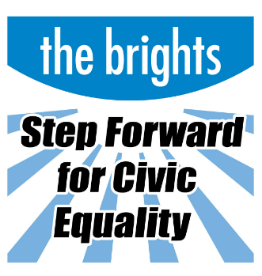Some Civic Considerations
To establish the civic worth of persons who rely on naturalistic explanations, some approaches are likely to be more fruitful than others.
Outshining a Single Idea
In many societies across the world, brights are viewed and characterized through the lens of dominant religion. It is common for a bright to be considered a "nonbeliever" over and above many other attributes. Especially in a monotheistic culture, this narrow characteristic is also how many brights have come to see and define themselves.
Self-identity by reference to a single culturally favored and dominant idea is not conducive to gaining broader social acceptance and civic influence. A stance may be meritorious in itself, but the narrow focus generally works to the disadvantage of brights as citizens.
To dwell in the context of religion can continuously magnify the contrast (over the commonalities) and undermine a great many useful civic considerations (e.g., equality and fair play). We who have a naturalistic worldview too often fail to to project ourselves for who we really are. We focus narrowly (just as society does). We use too slim a self-conception of ourselves.
A worldview is a sweeping perspective and set of beliefs about the world.
Yes, brights do have beliefs. (All humans do.) We have values, too. If our fellow citizens are to recognize our worth in the civic sense, it is important that we be seen in a civic sense. We must be viewed as more than "nonbelievers".
When we carry forward "a pinched identity" we easily feed into dominant perceptions and biases that, in turn, produce the very limitations that constrain our opportunities and actions as citizens. Establishing the context as religion usually grounds and maintains conversation and dialogue within the same realm of religion. We needn't define ourselves so narrowly.
Presenting the Broader You
Brights really need to consider their identity and the many facets of their naturalistic outlook in order to better present themselves broadly in public contexts such as politics, commerce, education and service.
Brights can help to advance the civic situation of those who have a naturalistic worldview. One way is through strategies that take you out of religion and into civics. It's a lot like being bilingual rather than speaking just one language.
Civics is a different framework with different attributes. In many democratic societies, some of these features are helpful to the case of civic pluralism and the efforts of citizens to press for civic equality and participation.
Just as one sport differs from another in the form of playing field, equipment and rules, a civics framework calls forth different approaches, strategies, and language.
Civics Is a Different Ballgame
You can play it! But doing so probably relies on capacity to reconsider some customary habits and terminology. To press for rights of civic participation, "think civics" and promote "civic principles".

Speaking the language of beliefs is not helpful. We must speak about civic fairness. We must set civic equality as a goal.
Openness
Visibility
Constructive engagement
Principled participation
Brights in Society
When those who hold a naturalistic worldview merit a position of civic equality but do not hold the status, the situation deserves serious analysis.
What holds us back as citizens?
It is customary to consider other hindrances ( to what extent and how we are hindered by others, by religion, etc.) Less often considered is this question: To what extent do we disadvantage ourselves?
To have hope of building civic influence, we must be wary of seeing ourselves only through the lens of religion, where we are so readily deemed religiously deficient. To press for civic equality, there is the option of presenting ourselves broadly and in a creditable civic sense, by our naturalistic worldview. It's an option. Perhaps more will take this option.

